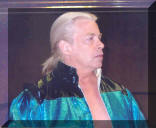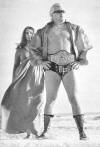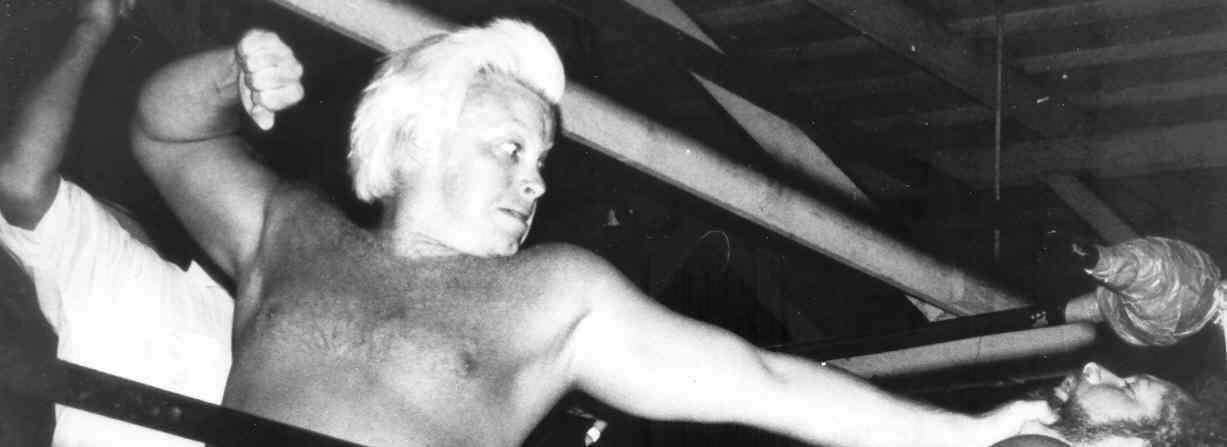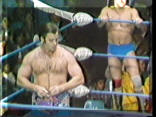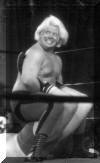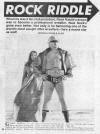I looked at my pay slip. I turned to the wrestler who had asked me the question. “I got twelve hundred for the Cow Palace last week,” I said. “Yeah?” he asked, sounding a little surprised. “I made nine-fifty. That cheap bastard promoter makes over a hundred grand and gives us a grand apiece.” I smiled. “Well,” I said, “you still probably made close to three grand last week. It sure beats working for a living. Just put a little aside each week, and down the road you can start your own wrestling promotion, and then YOU can cheat the ‘boys.’” “Yeah, right,” he said as he picked up his gear, turned his back, and stomped over to the other side of the locker room. He figured that he would certainly find more sympathetic ears there. He was right. I smiled as I heard him begin again. “Hey, Jerry, how much did you get for working the Cow Palace last week …?” I never complained about money. Several years into my career, I sat down with paper, pen, and calculator to see just what my time in the ring brought me financially. I was pleasantly surprised to discover that, in a number of venues, I was averaging between $21.00 and $64.00 PER MINUTE in the ring. “Where else,” I thought, “could I possibly average over $1,200.00 per hour – doing something I would do for free?”
I knew I had chosen the perfect profession. I was living my ultimate dream and being paid, I thought, very well for it. Money was never a problem. Because the wrestlers were recognized and respected considerably more that “major movie stars,” we received many “perqs.” From McDonalds to major five-star restaurants, there was at least a one-in-four chance that the meal would be “on the house.” We were celebrities, and we were treated as such. I don’t remember, for example, ever standing in any line for anything for more than a few seconds during my entire wrestling career. Many of us lost touch with the value of money. Many times, three or four or five of us would go to a restaurant for a meal. We never cared what anything cost, and usually, the first person who thought of it would drop three hundred-dollar bills on the table as a tip. Occasionally, we would ask the waitress to bring us someone else’s bill as well. “Yeah, you see those four people at that table?” we’d ask the waitress. “Well, just add their bill to ours.” Sometimes we’d anonymously send desserts or drinks to other diners, just to see their reactions. It was strange: On trips, we would go blocks out of our way to buy the cheapest gas, but we would leave a few hundred dollars as a tip at a restaurant. I remember being in a grocery store in Pensacola, Florida. Miss Pamela, a tall blonde lady who worked as my valet for a couple of years, was in the checkout line with me. The checker was a huge fan and really went out of her way to be nice. I had rented a beautiful seaside house directly on the water at Pensacola Beach, and I was stocking up. We had two shopping carts full of food. As the checker was ringing up our items, I looked at Ms. Pamela. “This lady is doing a great job,” I said. “What do you think about giving her a tip?” “Sure, if you want to,” Ms. Pamela replied. I thought for a moment and then asked, “Do you think a hundred and fifty dollars would be a good tip? Would that mean something to someone who has a regular job?” I asked the question in all sincerity. I had become used to having money, so much so that I had lost track of its value. I would frivolously spend one or two thousand dollars a week, week after week, for months at a time. It was a strange but interesting situation in which to be. I figured that it was better to have money and not understand its value, rather than understand its value but not have it.
Note: All monetary references in this column (Over the Top Rope #40) are expressed in “today’s dollars.” ◘ |
|||||||||||||
|
This column welcomes your wrestling-related
questions. You may contact the author via email: RockRiddle@hotmail.com
or
Rock@HollywoodSuccess.com.
Be sure to put "Wrestling Question" in the subject line.
© 2006 Rock Riddle & Hollywood Success. |
|||||||||||||
| Previous Column | Wrestling Revue Home Page | Next Column | |||||||||||
